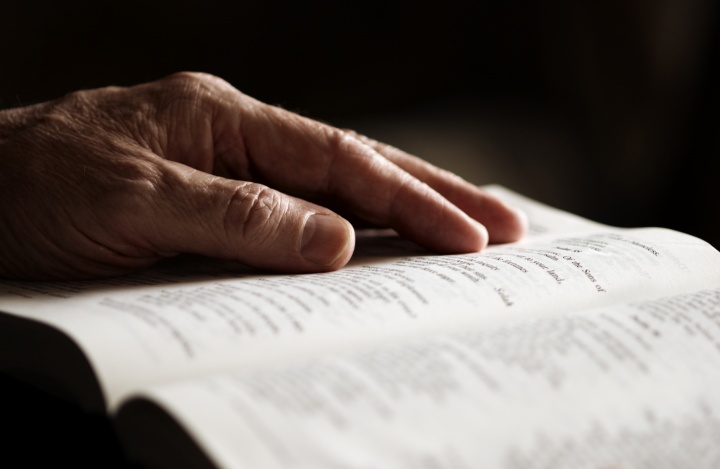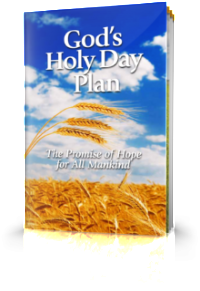For “Scripture Sunday” and Monday:
Why Should Christians Celebrate the Feast of Trumpets?
“Prophecies of the end time include trumpet plagues and the return of Jesus Christ at the last trump. What does the Feast of Trumpets mean for Christians today?
 Philipp Reiner/Unsplash
Philipp Reiner/Unsplash
Christ's return is announced by the seventh and final trumpet
The fourth festival of God (after Pentecost) is the Feast of Trumpets (or a “memorial of blowing of trumpets,” Leviticus 23:24-25), which falls in September or October. This festival is called Rosh Hashanah by the Jews today. Ancient Israel understood that trumpets were used as a way of announcing special, very important messages (Numbers 10:1-10).
In the New Testament, Jesus Christ reveals that before His return to the earth, there will be the blowing of seven trumpets, announcing progressive stages of the downfall and overthrow of this world’s kingdoms, ending with the return of Christ to take possession of the earth. Christ’s return is announced by the seventh and final trumpet (Revelation 8:2; Revelation 11:15). This day also pictures the time when faithful Christians will be resurrected to eternal life at the time of the seventh trumpet (1 Corinthians 15:52; 1 Thessalonians 4:16) to reign with Jesus Christ for 1,000 years (Revelation 20:4-6).
Interestingly, it was around this time of year that Jesus was born—not in the dead of winter (see “Biblical Evidence Shows Jesus Wasn’t Born on December 25 “). And the fall feast season represents the time when Jesus Christ will come to the earth again to reign in glory.
The remaining fall feast days describe steps in the establishment of the prophesied Kingdom of God on earth and judgment of humanity after Christ’s return. The Feast of Trumpets is followed by the Day of Atonement.” From: https://www.ucg.org/bible-study-tools/bible-questions-and-answers/why-should-christians-celebrate-the-feast-of-trumpets
________
The Biblical Feast of Trumpets, Foretelling 'the Day of the Lord'
“Does this ancient biblical feast hold great meaning for Christians today?
 Photos.com
Photos.com
Most Christians find little meaning in God's Holy Days, but could they hold an important message for you and your future?
Every autumn the Jewish community observes a holiday called Rosh Hashanah (meaning “head of the year,” because it begins the Jewish civil year). This is a biblical festival, known in Scripture as Yom Teruah, the Day of Trumpets, because the Israelites were to blow trumpets on that day (Leviticus 23:24). A shofar, or ram’s horn, is blown calling the faithful to 10 days of repentance culminating in another biblical festival, Yom Kippur or the Day of Atonement.
Most Christians find little meaning in these days, but could they hold an important message for you and your future?
In ancient Israel the shofar was blown for various reasons, including a call to war. Jewish leaders in the first century had to take care when they blew the shofar on the Feast of Trumpets so that the occupying Roman soldiers didn’t think a rebellion was being launched.
The Bible speaks of a time before Christ’s return when the earth will be engulfed in war, famine, disease epidemics, earthquakes and other colossal disasters. This era, called “the great tribulation” (Revelation 7:14; Matthew 24:21), will bring humanity to the brink of total destruction—necessitating God’s promised intervention in human affairs.
The period of God’s intervention is called “the day of the Lord.” It is also a time known for the blowing of trumpets.
The prophetic Day of the Lord
The Day of the Lord includes a series of cataclysmic events leading up to the return of Jesus Christ and His forceful suppression of humanity’s rebellion against God.
It’s important to understand that prophecies concerning the Day of the Lord can at times have a former and later fulfillment. What that means is that the messages of the ancient prophets applied in part to the people to whom they were preaching, but many of these prophecies also refer to a future time when God will intervene in the affairs of mankind—a time that is yet to occur.
Many references to the Day of the Lord in the biblical books of Isaiah and Joel refer to punishment God poured out on ancient Israel and Judah. But when reading these prophecies, and comparing them with historical information, it is clear that they are dual in nature and were only partially fulfilled. These verses primarily look to the future when God will pour out His judgment on an unrepentant humanity before the second coming of the Messiah.
This may not be a popular message in today’s environment of feel-good religion, but, as we always do on Good News Radio and in our publications, we turn to the Bible as the Word of God in our search for truth.
Many centuries ago, the prophet Zechariah was inspired to write: “Behold, the day of the Lord is coming, and your spoil will be divided in your midst. For I will gather all the nations to battle against Jerusalem; the city shall be taken, the houses rifled, and the women ravished. Half of the city shall go into captivity, but the remnant of the people shall not be cut off from the city.
“Then the Lord will go forth and fight against those nations, as He fights in the day of battle. And in that day His feet will stand on the Mount of Olives, which faces Jerusalem on the east. And the Mount of Olives shall be split in two …” (Zechariah 14:1-4).
God’s future intervention
God is a God of love and mercy. But He is also a just and righteous God who doesn’t compromise with evil. Instead of repenting and acknowledging their Creator, most of humanity has been snubbing their collective noses at Him in a pretense of religion and suffering the consequences. But a time is coming when He will intervene by sending Jesus Christ to rule over the nations and save us from ourselves.
Many Old and New Testament prophecies describe the coming Day of the Lord, including those of the seven trumpets in Revelation 8-11. They create a composite picture of a time of blowing of trumpets, a time of catastrophic war, and a time when all nations will be brought together to be judged by God.
The Feast of Trumpets contains an important message for Christians. In fact, it is the most important news on the globe today. It heralds the gospel’s emphasis on repentance and judgment, the warning blasts of the shofar, the Day of the Lord and the proclamation that the Messiah is returning to establish God’s Kingdom on the earth.
Jesus Himself makes a key statement in His Mount Olivet prophecy recorded in Matthew 24: “Immediately after the tribulation of those days the sun will be darkened, and the moon will not give its light; the stars will fall from heaven, and the powers of the heavens will be shaken.
“Then the sign of the Son of Man will appear in heaven, and then all the tribes of the earth will mourn, and they will see the Son of Man coming on the clouds of heaven with power and great glory. And He will send His angels with a great sound of a trumpet, and they will gather together His elect from the four winds, from one end of heaven to the other” (Matthew 24:29-31).
Notice that the return of Jesus Christ is accompanied by the sound of a trumpet.
The apostle Paul encourages Christians to keep the coming Day of the Lord in mind. He writes to the church in Thessalonica: “For you yourselves know perfectly that the day of the Lord so comes as a thief in the night. For when they say, ‘Peace and safety!’ then sudden destruction comes upon them, as labor pains upon a pregnant woman. And they shall not escape.
“But you, brethren, are not in darkness, so that this Day should overtake you as a thief. You are all sons of light and sons of the day. We are not of the night nor of darkness. Therefore let us not sleep, as others do, but let us watch and be sober. For those who sleep, sleep at night, and those who get drunk are drunk at night.
“But let us who are of the day be sober … For God did not appoint us to wrath, but to obtain salvation through our Lord Jesus Christ, who died for us, that whether we wake or sleep, we should live together with Him” (1 Thessalonians 5:2-10).
Indeed, the resurrection of the saints to reign with Christ in glory will come at the sounding of the last trumpet (1 Corinthians 15:51-52; 1 Thessalonians 4:16-17).
The prophesied Day of the Lord is coming. The trumpet will sound, the saints will be raised from the grave and Jesus Christ will return to establish His Father’s Kingdom on the earth. The Feast of Trumpets isn’t just for the Jewish people. It is a very special day for all those who wait for the Messiah.” From: https://www.ucg.org/the-good-news/the-biblical-feast-of-trumpets-foretelling-the-day-of-the-lord
_______
Discover the biblical festivals that teach us about God’s plan to restore our world and save mankind.
Feast of Trumpets - September 30, 2019
Day of Atonement - October 9, 2019
Feast of Tabernacles - October 14-20, 2019
The Eighth Day - October 21, 2019
________
Update.
That was an expensive trip to the store the day I got lost and stuck in the mud! When I called the repair shop on Monday to get the dented oil pan on my van replaced, they said not to drive it. The clattering noise meant that part of the engine was hitting the oil pan. The repair shop has a wrecker, but it was going to cost me so I called my Emergency Road Service. A couple of days later it was ready, so the Service Coordinator here at these senior apartments took me to pick it up. That is one thing about living here, they take care of their senior residents. I had no idea such great places existed, or I would have moved out of my house 18 years ago when Johnny died.
After I drove Cherry, my neighbor to church, I saw the passenger side of my van.. Oh Dear!! It was all mud splattered, and I had driven it to church like that. I took another store bought Cheddar Chipotle Salad because it was so popular last time, but I can’t eat it, that dressing is way too spicy for me. The message was “I can See Clearly Now”, based on Mark 8:22-26. Our Lord took the blind man and led him, and we all need leading sometimes.
On Sunday afternoon we had the usual Bible study in the Community room. That is what is so neat about living here, there are functions, not like a regular apartment complex so you don’t have to be on you own all the time. Doesn’t bother me, I am used to it, but some people can’t stand their own company. Sometimes it is Bingo, sometimes it is information about Medicare and similar, and this week they also had a Fall Prevention talk, as so many seniors fall. Sometimes it is just a bunch of us gathered on the chairs under a tree, yapping.
This Monday, yesterday, I needed to find a car wash, but it was a special Sabbath, The Feast of Trumpets, so I drove back to my old church in Willis, and celebrated the feast with them. It was so great to see them. The Teaching was from Lev. 23:23-25 where it tells about the feast.
The Feast of Trumpets: Then the Lord spoke to Moses, saying, 24 “Speak to the children of Israel, saying: ‘In the seventh month, on the first day of the month, you shall have a sabbath-rest, a memorial of blowing of trumpets, a holy convocation. 25 You shall do no customary work on it; and you shall offer an offering made by fire to the Lord.’ ”
As I was so close, I did go to my storage in Willis, but I didn’t bring anything back with me for three reasons, one because I couldn’t move some of it by myself, and if I did, I didn’t have anywhere to put it, but the main reason was that it was a holy day.














2 comments:
Great post as always, keep up the good work.
Thank you, DD
Post a Comment